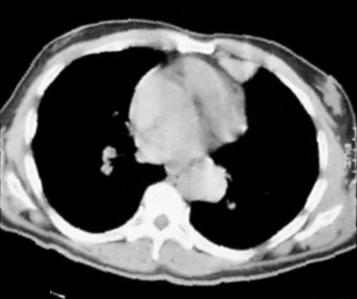Case Author(s): Jeff Chesnut, D.O. and Keith Fischer, M.D. , 5/22/99 . Rating: #D1, #Q5
Diagnosis: Thoracic splenosis
Brief history:
53 year old male who sustained a gunshot wound to the
abdomen many years earlier. Recent chest CT showed
multiple pulmonary nodules.
Images:

A single transaxial slice from a CT scan through the lung bases is shown.
View main image(ct) in a separate image viewer
View second image(si).
Images from heat-damaged red blood
cell scintigram.
Full history/Diagnosis is available below
Diagnosis: Thoracic splenosis
Full history:
56 year old man who sustained a gunshot wound to his
abdomen and underwent subsequent splenectomy many
years ago. A CT scan of his chest demonstrated multiple soft
tissue masses of various sizes in the left hemithorax.
Radiopharmaceutical:
Tc-99m labeled heat-damaged red blood cells
Findings:
Multiple foci of tracer activity are seen in the left hemithorax
on the heat-damaged red blood cell scintigram
Discussion:
One of the spleen's functions is to remove damaged red
blood cells from the circulation. Advantage may be taken of
this function when searching for ectopic splenic tissue by
radiolabeling damaged red blood cells. The red blood cells
are damaged by heating them to 50 degrees Centigrade for 30
minutes on a heat block.
Splenosis is a common sequela of splenic rupture. Splenic
tissue can implant in the chest through a rent in the
diaphragm or through an anatomic hiatus. Splenosis should
enter the differential diagnosis when a soft tissue mass is
found in the chest of a patient who has experienced severe
abdominal trauma where there was a high liklihood of
diaphragmatic trauma such as as in a motor vehical accident
or gunshot wound.
Major teaching point(s):
1. Heat damaged red blood cells are highly effective in the
detection of ectopic splenic tissue.
2. Splenosis should be
considered when a soft-tissue mass is detected in the chest of
a patient who has undergone remote severe abdominal
trauma.
ACR Codes and Keywords:
References and General Discussion of Spleen Imaging (Anatomic field:Gasterointestinal System, Category:Effect of Trauma)
Search for similar cases.
Edit this case
Add comments about this case
Return to the Teaching File home page.
Case number: si004
Copyright by Wash U MO

